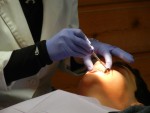
For patients that are missing teeth, dental implants are an important treatment option for restoring a natural-looking smile and chewing function. A major benefit of an implants is the authentic look, feel, and function of the teeth that they replace. However, great oral health habits are vital in maintaining your implants as well as protecting the investment you placed in them. Your natural teeth and gums require good brushing and flossing to remain healthy. Implant-supported teeth require this same or even greater attention to cleanliness.
Without proper care, inflammation and infection of the gums and bone surrounding the implant can occur. This condition is referred to as Peri-Implant Disease. While Gingivitis and Periodontal Disease affects the tissues and the bone surrounding your regular teeth, Peri-Implant Mucositis and Peri-Implantitis are the equivalent diseases that affect the tissues surrounding your dental implants.
What Are The Symptoms of and Risk Factors for Peri-Implant Disease?
The symptoms and early signs of Peri-Implantitis are similar to those of Gingivitis and Periodontal Disease:
- Red or tender gums around the implants
- Bleeding during brushing or flossing
- For most patients, there is no pain associated with Peri-Implant Disease until it is in its advanced stages
- Gums look like they’re receding or pulling away from the implant-supported teeth or surrounding natural teeth
- Bad breath or odd tastes in the mouth
In many cases, there are no detectable symptoms of Peri-Implant Disease by the patient. Your dentist may be the first person to detect a problem, through dental x-rays and a clinical examination.
Risk factors for Peri-Implant Disease are similar to their natural tooth equivalents:
- Previous Periodontal Disease
- Smoking
- Insufficiently treated Diabetes
- Poor oral hygiene
- Genetic factors
- Retained cement found on the implant restoration under the gum line. Some report that this happens in 70 percent of Peri-Implant Disease cases.
What Are the Stages of Peri-Implant Disease?
In Peri-Implant Mucositis, inflammation of the gum tissues is only found immediately around the dental implant, and this disease is easily reversed if it is caught early and treated effectively. It is similar to the gingivitis stage of periodontal disease around your original teeth.
- Mucositis moves on to Peri-Implantitis when the inflammation affects more of the surrounding tissue where it begins to degrade the bone that is supporting the dental implant. Once Peri-Implant disease reaches this stage, some level of surgical intervention is typically required.
- Peri-Implant disease is diagnosed using periodontal probes to determine the depth of the pockets of inflammation around the implant. X-rays are also used to see if any bone loss is occurring.
- Probe depths of more than 4 mm, especially with any bleeding during the probe, is indicative of some level of Peri-Implant disease. If there has been a bone loss of 2 mm or more seen on x-rays, then the diagnosis moves up to Peri-Implantitis.
How is Peri-Implant Disease Treated?
The best treatment for Peri-Implant Disease is to avoid it in the first place. While side effects and complications can happen with any surgery, using an experienced surgeon and planning carefully can avoid some of the risks. Proper home care, including great brushing and flossing habits can help keep the bacteria and plaque from building up and causing Peri-Implant Disease.
There are many treatment options – both surgical and non-surgical – for both levels of Peri-Implant Disease. Teamwork between your dentist, surgeon, dental lab and you as a patient is vital to the long-term successful outcome. Debridement or the scaling of plaque and bacterial deposits from the implant surface is sometimes combined with systemic antibiotics to treat this disease. Debridement can be performed with titanium or ultrasonic tools.
If the gum tissue pocket depth is too deep for manual cleaning, or if there is bone loss that needs to be corrected, then surgical therapy may be required to give Dr. Alger access to the implant and the supporting bone. Surgery is avoided whenever possible. However, if surgical therapy is required, rest assured that Dr. Alger will provide you with the best care possible.
Brushing, flossing and annual routine check-ups are critical steps necessary to maintain the health of your implants. If you already have Peri-implant disease, Dr. Alger is here to help. Contact us to schedule an appointment to keep your implants and the surrounding tissues healthy today and well into your future.




